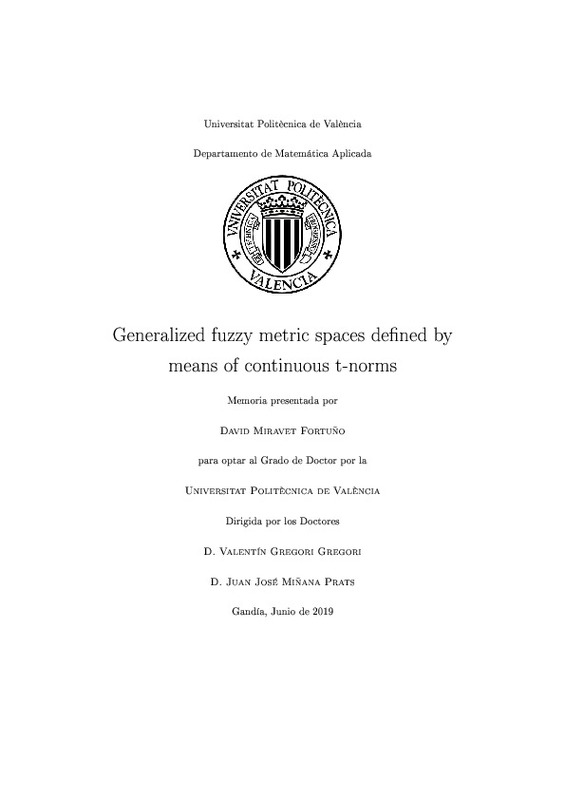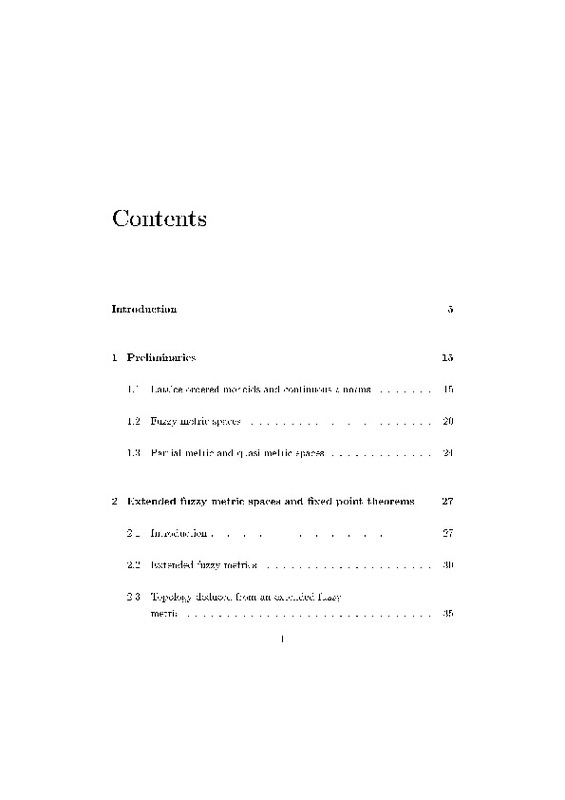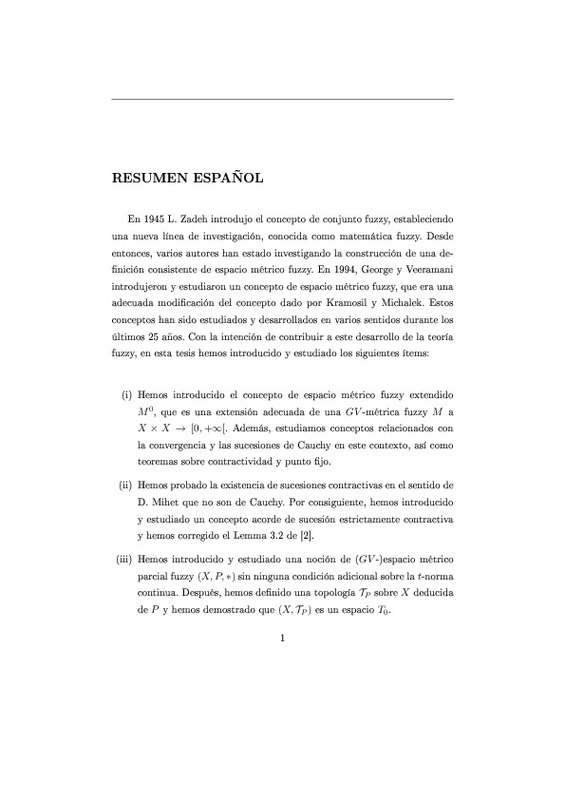- RiuNet repositorio UPV
- :
- Investigación
- :
- Tesis doctorales
- :
- Ver ítem
JavaScript is disabled for your browser. Some features of this site may not work without it.
Buscar en RiuNet
Listar
Mi cuenta
Estadísticas
Ayuda RiuNet
Admin. UPV
GENERALIZED FUZZY METRIC SPACES DEFINED BY MEANS OF T-NORMS
Mostrar el registro sencillo del ítem
Ficheros en el ítem
| dc.contributor.advisor | Gregori Gregori, Valentín
|
es_ES |
| dc.contributor.advisor | Miñana Prats, Juan José
|
es_ES |
| dc.contributor.author | Miravet Fortuño, David
|
es_ES |
| dc.date.accessioned | 2019-09-03T06:14:30Z | |
| dc.date.available | 2019-09-03T06:14:30Z | |
| dc.date.created | 2019-07-29 | es_ES |
| dc.date.issued | 2019-09-02 | es_ES |
| dc.identifier.uri | http://hdl.handle.net/10251/124816 | |
| dc.description.abstract | [ES] En 1965 L. Zadeh introdujo el concepto de conjunto fuzzy, estableciendo una nueva línea de investigación, conocida como matemática fuzzy. Desde entonces, varios autores han estado investigando la construcción de una definición consistente de espacio métrico fuzzy. En 1994, George y Veeramani introdujeron y estudiaron un concepto de espacio métrico fuzzy, que era una adecuada modificación del concepto dado por Kramosil y Michalek. Estos conceptos han sido estudiados y desarrollados en diversas líneas durante los últimos 25 años. Con la intención de contribuir a este desarrollo de la teoría fuzzy, en esta tesis hemos introducido y estudiado los siguientes ítems: 1. Hemos introducido el concepto de espacio métrico fuzzy extendido M0, que es una extensión adecuada de una GV-métrica fuzzy donde el parámetro t puede tomar el valor 0. Además, hemos estudiado conceptos relacionados con la convergencia y las sucesiones de Cauchy en este contexto, así como teoremas sobre contractividad y punto fijo. 2. Hemos probado la existencia de sucesiones contractivas en el sentido de D.Mihet en un espacio métrico fuzzy en el sentido de George y Veeramani que no son de Cauchy. En consecuencia, hemos introducido y estudiado un concepto adecuado de sucesión estrictamente contractiva y hemos corregido el Lema 3.2 de [V. Gregori and J.J. Miñana, On fuzzy psi-contractive sequences and fixed point theorems, Fuzzy Sets and Systems 300 (2016), 93-101]. 3. Hemos introducido y estudiado una noción de (GV-)espacio métrico parcial fuzzy (X,P,*) sin ninguna condición adicional sobre la t-norma *. Después, hemos definido una topologia T_P sobre X deducida de P y hemos demostrado que (X,T_P) es un espacio T0. 4. Hemos relacionado el mencionado concepto de GV-espacio métrico parcial fuzzy con la noción de GV-espacio casi-métrico fuzzy definido por Gregori y Romaguera en [V. Gregori and S. Romaguera, Fuzzy quasi-metric spaces, Applied General Topology 5 (2004), 129-136]. Se ha estudiado una dualidad entre estos espacios, imitando las técnicas utilizadas por Matthews en [S.G.Matthews, Partial metric topology, Annals of the New York Academy of Sciences 728 (1994), 183-197]. | es_ES |
| dc.description.abstract | [CA] En 1965, L. Zadeh va introduir el concepte de conjunt fuzzy, establint una nova línia d'investigació, coneguda com matemàtica fuzzy. Des d'aquell moment, molts autors han investigat la construcció d'una definició consistent d'espai mètric fuzzy. En 1994, George i Veeramani van introduir i estudiar una noció d'espai mètric fuzzy, realitzant una modificació adequada del concepte donat per Kramosil i Michalek. Aquests conceptes han estat estudiats i desenvolupats en diversos sentits durant els últims 25 anys. Amb la intenció de contribuir a aquest desenvolupament de la teoria fuzzy, en aquesta tesi hem introduït i estudiat els següents continguts: 1. Hem introduït el concepte d'espai mètric extés M0, que és una extensió adequada d'una GV -mètrica fuzzy M on el paràmetre t pot prendre el valor 0. A més, hem estudiat conceptes relacionats amb la convergència i les successions de Cauchy en aquest context, així com teoremes sobre contractivitat i punt fixe. 2. Hem provat l'existència de successions contractives en el sentit de D. Mihet en un GV -espai mètric fuzzy que no són Cauchy. Conseqüentment, hem aportat i estudiat un concepte apropiat de successió estrictament contractiva i hem corregit el Lema 3.2 de [V. Gregori and J.J. Miñana, On fuzzy psi-contractive sequences and fixed point theorems, Fuzzy Sets and Systems 300 (2016), 93-101]. 3. Hem introduït i estudiat una noció de (GV -)espai mètric parcial fuzzy (X,P,*) sense cap tipus de condició addicional sobre la t-norma contínua *. A continuació, hem definit una topologia T_P sobre X deduïda de P i hem demostrat que (X, T_P) es un espai T0. 4. Hem relacionat el ja mencionat concepte de GV -espai mètric parcial fuzzy amb la noció de GV -espai quasi-mètric fuzzy definit per Gregori i Romaguera en [V. Gregori and S. Romaguera, Fuzzy quasi-metric spaces, Applied General Topology 5 (2004), 129-136]. S'ha estudiat una dualitat entre ambdós espais, imitant les tècniques utilitzades per Matthews en [S.G.Matthews, Partial metric topology, Annals of the New York Academy of Sciences 728 (1994), 183-197]. | ca_ES |
| dc.description.abstract | [EN] In 1965, L. Zadeh introduced the concept of fuzzy set, and thus established a new topic of research, known as fuzzy mathematics. Since then, several authors have been investigating the approach of a consistent fuzzy metric space theory. In 1994, George and Veeramani introduced and studied a concept of fuzzy metric space which was a proper modification of the concept given by Kramosil and Michalek. These notions have been studied and developed in several ways during the last 25 years. With the purpose of contributing to the development of the study of the fuzzy theory, in this thesis we have introduced and studied the following items: 1. We have introduced the concept of extended fuzzy metric M0 which is an appropriate extension of a GV -fuzzy metric M where the parameter t can take the value 0. Furthermore, we have studied convergence and Cauchyness concepts in this context, as well as contractivity and fixed point theorems. 2. We have proved the existence of contractive sequences in the sense of D. Mihet in a GV -fuzzy metric space which are not Cauchy. Then we have given and studied an appropriate concept of strictly contractive sequence and we have corrected Lemma 3.2 of [V. Gregori and J.J. Miñana, On fuzzy psi-contractive sequences and fixed point theorems, Fuzzy Sets and Systems 300 (2016), 93-101]. 3. We have introduced and studied a concept of (GV -)fuzzy partial metric space (X,P,*) without any extra conditions on the continuous t-norm *. Then we have defined a topology T_P on X deduced from P and we have proved that (X, T_P) is a T0 space. 4. We have related the aforementioned notion of GV -fuzzy partial metric space with the concept of GV -fuzzy quasi-metric space given by Gregori and Romaguera in [V. Gregori and S. Romaguera, Fuzzy quasi-metric spaces, Applied General Topology 5 (2004), 129-136]. A duality is studied by mimicking the techniques used in [S.G.Matthews, Partial metric topology, Annals of the New York Academy of Sciences 728 (1994), 183-197] by Matthews. | en_EN |
| dc.language | Inglés | es_ES |
| dc.publisher | Universitat Politècnica de València | es_ES |
| dc.rights | Reserva de todos los derechos | es_ES |
| dc.subject | Espacio métrico fuzzy | es_ES |
| dc.subject | Aplicaciones contractivas fuzzy | es_ES |
| dc.subject | Teoremas de punto fijo | es_ES |
| dc.subject | Normas triangulares | es_ES |
| dc.subject | Espacios métricos parciales | es_ES |
| dc.subject | Espacios casi-métricos | es_ES |
| dc.subject.classification | MATEMATICA APLICADA | es_ES |
| dc.title | GENERALIZED FUZZY METRIC SPACES DEFINED BY MEANS OF T-NORMS | es_ES |
| dc.type | Tesis doctoral | es_ES |
| dc.identifier.doi | 10.4995/Thesis/10251/124816 | es_ES |
| dc.rights.accessRights | Abierto | es_ES |
| dc.contributor.affiliation | Universitat Politècnica de València. Departamento de Matemática Aplicada - Departament de Matemàtica Aplicada | es_ES |
| dc.description.bibliographicCitation | Miravet Fortuño, D. (2019). GENERALIZED FUZZY METRIC SPACES DEFINED BY MEANS OF T-NORMS [Tesis doctoral]. Universitat Politècnica de València. https://doi.org/10.4995/Thesis/10251/124816 | es_ES |
| dc.description.accrualMethod | TESIS | es_ES |
| dc.type.version | info:eu-repo/semantics/acceptedVersion | es_ES |
| dc.relation.pasarela | TESIS\12754 | es_ES |
Este ítem aparece en la(s) siguiente(s) colección(ones)
-
Tesis doctorales [5389]










